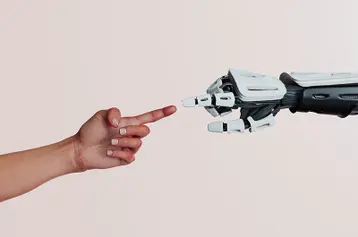AI Use in the Workplace Is Way Up Among US Employees, In Ways that Might Surprise You

Overview
According to the State of the Workplace 2025 report, AI adoption surged across small and midsize U.S. businesses, with 94% of employers and 84% of employees have used AI on the job. Employees are increasingly using AI for sensitive and personal workplace needs:
- Performance reviews: “Extremely Acceptable” ratings rose 46%, from 20% to 29%.
- Personal HR questions: Up 26%, from 23% to 29%.
- Interpersonal issues: Up 50%, from 18% to 27%.*
This shift marks a cultural turning point—AI is now seen not just as an administrative tool but as an option for assisting in HR tasks. Employees’ reliance on AI “Every Time” jumped 10 points, while “Never” responses dropped by half.
Key takeaway:
AI may gradually be shifting from back office support to more visible role in the employee experience. SMBs that combine transparency, bias checks, and human oversight can lead in trust, efficiency, and engagement.
Artificial intelligence has rapidly moved from novelty to necessity in American workplaces—and nowhere is this more apparent than in small and midsize businesses (SMBs). What’s striking isn’t just the breadth of AI’s adoption, but the types of tasks employees and employers are increasingly using AI for support.
It’s one thing to lean on automation for payroll processing or routine benefit questions. It’s quite another to use AI for HR to assist with performance review or HR matter. Yet that’s where the data shows usage climbing fastest, pointing to a surprising cultural shift in how employees perceive—and prefer—AI use at work.

State of the Workforce 2025
Data and learnings about small business engagement, retention, benefits, AI and more.
AI’s Mainstream Moment
AI is no longer on the margins of workplace tech stacks. Among small businesses, 94% of employers and 84% of employees have used AI on the job, a widespread use that is comparable to the adoption of email or video conferencing.
The integration is especially strong in HR. Two out of three employees report using AI frequently for HR-related tasks, a striking level of penetration given the traditionally sensitive nature of the function. Employee use is not only widespread but habitual: the share of employees saying they use AI “Every Time” for HR jumped 10 points year over year , while the share who say they “Never” use AI dropped by almost half, from 23% in 2024 to just 12% in 2025.
These numbers suggest that a workplace where AI isn’t just only accepted—it’s increasingly becoming part of the norm.
From Routine Questions to Sensitive Issues
The most surprising growth is not in routine tasks but in highly personal or sensitive HR contexts.
- Performance reviews: Employer comfort with AI jumped sharply, with those rating it “Extremely Acceptable” climbing from 20% to 29%—a 46% increase in just one year. Employees followed suit, with a sharp decline in those saying they “Never” use AI for reviews (26% in 2024 down to 14% in 2025).
- Personal HR questions: When it comes to matters like compensation details or policy clarifications, “Extremely Acceptable” ratings rose from 23% to 29%—a 26% increase. Employee usage patterns echo this shift, with steep declines in “Never” responses and steady gains in the “Every Time” and “Almost Every Time” categories.
- Interpersonal issues: Perhaps most surprising, nearly one in three employers (27%) now find it “Extremely Acceptable” to use AI for interpersonal HR situations, up from 18% the year prior—a 50% increase. Employees are quickly adapting as well, with a 9-point jump in “Every Time” usage and a steep decline in “Never,” which fell to just 11% from 23%.
Taken together, these shifts signal that AI may no longer be viewed solely as an administrative helper. It is increasingly seen as a supportive tool in areas that touch directly on employee experience and career trajectory.
The Rise of AI Assistant Support
Employees are also growing more comfortable letting AI assist in HR matters. Preference for AI assistant support in general HR questions rose to 38% in 2025, up from 30% the year before.
That 8-point increase is significant because it may signal a broader cultural adjustment: many employees may now see AI not just as a complement to HR staff but as a potential support solution in certain contexts. Whether this reflects trust, efficiency, or simply a desire for privacy, it marks a fundamental redefinition of HR’s front door.
Why Employees Are Turning to AI
Survey data reveals several factors driving this adoption:
- Speed and reliability. More than half of employers (52%) cite speed as AI’s top advantage, and 44% cite reliability. These benefits are equally felt by employees navigating routine HR questions or policy explanations.
- Ease of use. Roughly a third of employers highlight AI’s simplicity, reflecting user-friendly interfaces and mobile accessibility.
- Avoidance of politics and retaliation. For sensitive issues—like conflicts with a coworker or concerns about bias—AI provides a channel free from perceived judgment or repercussions. Employees may be leaning on AI in part because it offers a sense of impartiality and private.
The trust employees are placing in AI for interpersonal matters suggests they see it as a more comfortable first stop than a manager or HR generalist.
Where Employers Stand
Employers, too, are leaning more heavily on AI in HR. Nearly every major category of HR tasks showed increased willingness to delegate responsibilities to AI:
- Benefits administration: Up to 36% in 2025 from 26% in 2024.
- Performance management: Up to 33% in 2025 from 24% the year before.
The exceptions are notable. Delegation of employee offboarding dropped slightly (32% vs. 34%), and training and development slid to 23% from 26%. These declines may reflect areas where the human touch remains more important—or where employers are more cautious due to potential risks.
Overall, though, the trend is clear: AI is steadily expanding from back-office tasks into functions traditionally relied on human judgment and interaction.
The Uneven Pace of Trust
While comfort levels are rising, concerns haven’t vanished—especially among employees. In fact, employee worries increased across the board:
- Bias/discrimination: Up 0.27 points year over year, the steepest rise.
- Follow-through: Up 0.18 points, suggesting anxiety over whether AI-based decisions will actually be implemented fairly.
- Accuracy and privacy: Both saw meaningful increases, reflecting persistent unease with the risks of relying on algorithms.
By contrast, employer concerns have stayed relatively flat. The only meaningful decline was in “No Action/Follow-through,” which dipped slightly.
This divergence underscores a tension: while employers may see AI as efficient and reliable, employees may remain wary about whether fairness and accountability will keep pace with adoption.
What This Means for Small and Midsize Businesses
For SMBs, the implications are two-fold:
- AI is now a competitive edge. With 94% of employers using AI, companies that resist use may risk falling behind in efficiency, speed, and employee expectations.
- Sensitive use cases require safeguards. Employees are increasingly turning to AI for HR tasks. Without clear policies, transparency, and oversight, this trust could backfire if employees perceive bias, privacy concerns, or inconsistent follow-through.
Practical Steps for Small Business Leaders & HR Teams
Here are insightful ways small business leaders and HR staff can explore to address these trends:
- Create clear guardrails. Define where AI can assist and human oversight should be mandatory. For example, AI may draft performance review feedback, but final review and/or delivery should come from a manager.
- Communicate openly. Employees need to know how AI tools work, what data they use, and what protections are in place. Transparency builds trust.
- Blend human and machine. Use AI as a first-line responder for common HR questions but employees should always have access to a live person when issues escalate.
- Audit for bias and accuracy. Regularly test AI outputs for fairness and reliability. This is especially critical in performance reviews and interpersonal contexts.
- Invest in training. Help employees understand how to use AI responsibly and effectively. This both improves adoption and reduces misuse.
Looking Ahead
The trajectory is unmistakable: AI is not just spreading across small businesses—it is deepening into the very heart of the employee experience. The fact that employees are turning to AI to assist with performance reviews, personal HR questions, and interpersonal issues would have seemed far-fetched just a few years ago. Based on the State of the Workplace 2025 report, it’s the fastest-growing category of use.
This shift challenges long-held assumptions about the inherently “human” nature of HR. It doesn’t mean people are obsolete in people management. But it does suggest that employees increasingly want AI as a neutral, accessible, and always-on tool to assist in HR tasks.
For small business leaders, AI offers more than just potential cost-savings, it can also support efforts with HR processes. Done right, AI can help promote fairness, consistency, and accessibility in HR. Not managed carefully, it could raise concerns and impact trust.
The next phase of workplace AI adoption may hinge not on whether companies use it, but more on how responsibly and thoughtfully they introduce it into the most human corners of work life.
*This article draws from the TriNet State of the Workplace 2025 report and reflects TriNet’s perspective based on survey data from over 1,000 participants. The findings offer insights into employer and employee views within the U.S. small business community, highlighting trends in engagement, wellbeing, AI use, and benefits understanding. Data may not represent all industries or regions, and while accuracy is a priority, applicability may vary by organization.
This content is for informational purposes only, is not legal, tax or accounting advice, and is not an offer to sell, buy or procure insurance. It may contain links to third-party sites or information for reference only. Inclusion does not imply TriNet’s endorsement of or responsibility for third-party content.
Table of contents
- 1.Overview
- 2.AI’s Mainstream Moment
- 3.From Routine Questions to Sensitive Issues
- 4.The Rise of AI Assistant Support
- 5.Why Employees Are Turning to AI
- 6.Where Employers Stand
- 7.The Uneven Pace of Trust
- 8.What This Means for Small and Midsize Businesses
- 9.Practical Steps for Small Business Leaders & HR Teams
- 10.Looking Ahead






